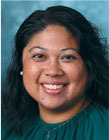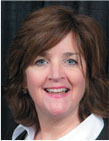


OUR HISTORY & AN EVOLVING HEALTHCARE ENVIRONMENT
Children are not little adults; they are quite different. Pediatric case management is unique and incredibly challenging because our patients cannot always speak for themselves. We navigate care through the eyes of the child, their parents and what resources are available beyond the hospital. We advocate for the best interest of the patient and family, as well as the hospital. Unlike our adult counterparts, pediatric case management is faced with narrow vendor availability, insurance coverage barriers, community programming and eligibility restrictions and limited pediatric licensed professionals and resources. Not only do we serve to treat the Chicagoland community, we provide care to patients from Illinois, outside of the state and internationally, which, can add that extra layer of complexity for access to care and transitions.
Despite these differences, we continue to follow the same principles as our adult colleagues to provide excellent coordination of care to our patients and families from admission through discharge and beyond. We promise to make maximum use of all resources available to assure that our patients have a successful transition to home or the next level of care.
As healthcare in the United States began to evolve and state government infrastructure changed, our CM team had to evaluate if our existing pediatric CM practices would allow us to meet the new obligations and expectations from an insurance perspective that previously did not impact pediatrics. Case managers were performing both discharge planning and utilization review. With a staff of 10 CMs and a workload of 24-30 patients, we quickly learned that we needed to invest in more case managers in order to support a new CM model under a new healthcare environment that was more proactive than reactive.
MODEL ASSESSMENT & CHANGE
Leadership investigated a split model with separate clinical case management and utilization review teams. They evaluated patient ratios per floor to identify the appropriate number of case managers needed to successfully perform our roles and meet the department expectations. A deep dive into utilization review was performed to determine the number of nurses needed to meet the demands of an increasing number of payer requests and scrutiny. In order to support this new model, our CM staff more than doubled. This model allowed the discharge planners, now called clinical case managers, to focus on more efficiently managing safe transitions and care coordination; and, the utilization review coordinator RN to focus on the utilization management and denial prevention of each hospitalized patient.
CLINICAL CASE MANAGERS (CCMS)
So, how did we elevate our change? We needed to increase our CM presence and voice. The CCMs began to attend morning rounds with the medical team to assess patients’ clinical status, identify discharge needs, identify potential discharge dates and discuss any barriers to discharge. Additionally, CM began attending multidisciplinary unit huddles daily (on some units twice a day) to continue to communicate the plan to all disciplines. A focus around care coordination, as a whole, became the focus including: quality time interviewing families, ensuring education is complete, coordinating equipment/supplies, confirming transportation is available the day of discharge, orchestrating that medications are at the bedside, coordinating follow-up appointments prior to discharge and increased communication.
The CCM role:
- Works closely with the medical team to identify personalized discharge goals and develops a care plan specific to the child’s need
- Ensures everything is in place for discharge to home, transitional care, inpatient rehabilitation or to another facility
- Connect families to ancillary resources and community supports
- Arranges medical transportation for discharge or transfer
- Makes referral to home health agencies and equipment companies
- Proactively anticipates medication prior authorization
- Arranges follow-up appointments with specialists or primary care providers
Pediatric challenges: The pediatric community faces many obstacles in ensuring access to care upon transition from the acute care hospitalization. Very few durable medical equipment companies specialize in providing services for the pediatric population, which are equally complicated by geographic limitations for accessibility. Therefore, sometimes the CCMs are negotiating with insurance companies for single case agreements when faced with access limitations due to insurance coverage or geographic availability. Medication availability for medications that are not yet FDA approved for children and have payer restrictions also pose an access obstacle. Often, navigating the insurance restrictions for children finds pediatric providers tied up in insurance red tape, rather than understanding the care needed for children to thrive in outpatient settings. Technology dependent and medically complex populations especially are set up for challenging transitions of care.
An example of the complexity of care required for a complex medical child includes a patient who requires a trained caregiver 24 hour a day, along with a secondary caregiver to support the primary caregiver. These patients need training of the ventilator, tracheostomy care, gastrostomy tube care/feeds, medication administration, oxygen and respiratory treatments before discharge. Families learn how to perform CPR via a tracheostomy and what to do in an emergency. This population requires private duty nursing in the home, which may (or may not) be provided by their private insurance and/or state government programing through the Division of Specialized Care for Children (DSCC). From the time a patient receives a tracheostomy and the referral process is made to DSCC and approved, family education/training is complete, private duty nursing is in place and equipment is delivered, it could take up to 6-8 weeks before the patient is discharged. When the patient is ready for discharge, the CCM arranges a discharge meeting with the family, private duty nursing agency, equipment company and DSCC to review the final nursing schedule, schedule equipment delivery date, discuss medications, follow-up appointments and transportation home. Transitional care is an option, if any family requires additional time for training and education, waiting for nursing to be placed in the home or if there are social barriers to discharge, although there are currently only four transitional care facilities in the Chicagoland area.
Indeed, there are parallels with complicated care coordination for both adult and pediatric populations. However, every day, we believe we make the impossible discharge possible.
UTILIZATION REVIEW COORDINATOR RN (UR RNS)
In compliance with state and federal regulations, the UR RNs manage utilization review by providing clinical information to payers for new inpatient admissions and concurrent stay reviews. UR RN’s work with our medical director and physician advisor team for status management of observation reviews. They work closely with the providers to ensure advocacy for services rendered to our kids. Our goal is to continue to stay current with the challenges in the everchanging healthcare environment, allowing us to stay on top of the payer demands, volume of requests, denial prevention and increased scrutiny from the payer site.
We utilize an evidenced-based tool, InterQual (IQ), to assist in utilization review management. However, like many resources available to pediatrics, we find IQ addresses common pediatric conditions but not the more complicated and rare conditions that we care for. Therefore, we are faced with denials as we all know UR tools cannot paint a true picture of what a patient really looks like and the medical care required to achieve the best possible outcome.
BEYOND A SPLIT MODEL
Clinical case manager and utilization review practices were not the only components that provided change within our model. We enhanced this care by providing a blend of additional nursing roles: case management specialist, outpatient case management, inpatient care coordinators, international case managers and clinical denial management nurses.
The case management specialist role is unique in providing support for department education, onboarding and orientation coordination and process improvement initiatives. This position allows for focused intent behind process change and separation of leadership responsibilities. Positive feedback for this role centers on the additional layer of support for staff, which can be imperative when implanting change. A dedicated person removes any pressure of administrative supervision and a heightened support model to encourage engagement and retention of new processes.
Our outpatient case manager is dedicated to hematology/oncology/stem cell transplant who focuses on medication prior authorizations and home care coordination within the outpatient space. This role is valuable as a resource for transition planning, as families leave the hospital and strive to maintain their care as an outpatient.
Inpatient care coordinators provide comprehensive care coordination for high-risk neonatal intensive care babies. Patients with three medical conditions and additional social determinants may meet program eligibility. The inpatient care coordinators have the lofty task of pulling together all of the components of care required for safe transitions, including: medical team & specialist communication and plan management, psychosocial support for parents, collaborative communication among multidisciplinary team members and discharge transition planning. This role works hand in hand with two outpatient care coordinators to provide the continuity from hospital to the next level of care.
International case managers provide the clinical care coordination support needed for our international patients and families. Unlike their CCM counterparts, these nurses follow patients during their outpatient and inpatient journeys in a new country and healthcare system. Like the inpatient care coordinators, this role is charged with coordinating all the components of care, but prior to starting care in the United States, while they are stateside, and as they repatriate to their home country. Along with assisting navigating the challenges of being in an unfamiliar environment, these nurses must maintain culturally sensitive considerations, in addition to managing the care required.
Clinical denial management nurses work with our case management medical director, CM leadership and attending physicians on denial management and prevention from a post-discharge perspective. The clinical denial management nurses also are at the core of one-day stay management, denial management and peer-to-peer coordination. These nurses also act as a resource to our UR RNs, with denial prevention and payer considerations while patients are admitted to the hospital.
At the core of our case management model is also our commitment to Lurie Children’s shared governance model within case management. This model provides a structure within case management where we continually work toward: standards of work, quality, staffing management and retention. Active participation of the staff within these shared governance committees affords opportunities for staff engagement and knowledge to be applied to best practices and outcomes measurement.
INCREASED VISIBILITY AND PARTICIPATION
Since we have implemented our case management model change, we have increased our visibility and participation within the organization. We are at the table and contributing to the quality of care needed for our patients and families. Case managers are educating and elevating our specialized knowledge to the current and future pediatric community. We continue to move toward elevating the practice of case management and care coordination. Our current pilot and future endeavors include expansion of Inpatient care coordinators and disease-based case management.
Feedback from around the organization has provided insights that our changes have been successful:
- “Constant excellence in facilitating discharge”
- “…you are the engine that turns the wheel of patient throughput. Your foresight and industriousness are essential to the day to day functioning of the PICU. Without your hard work, dedication, and insight, we would be lost and overwhelmed. Thanks for always being there for our patients, families, and providers.”
- “…parents and patients really appreciated having your help as it maintained stronger continuity between inpatient and outpatient care, facilitating better outcomes after discharge…”
- “… [CM’s] diligence and dedication to achieving a safe discharge plan for this patient and family did not go unnoticed. [CM] went above and beyond to set this family up for success once they walked out our doors.”
Pediatric case management might be challenging, but at the end of the day it is an extremely rewarding career. We have seen the case management department develop, grow and transform from being behind the scenes to the forefront, making an impact in the lives of our patients. As we continue our journey, we strive to be the leaders in pediatric case management to make a difference in this unique profession.




